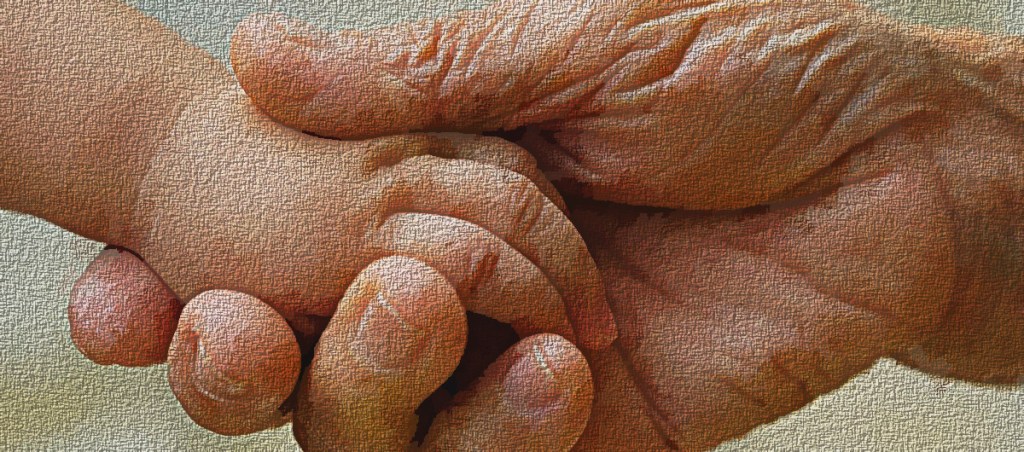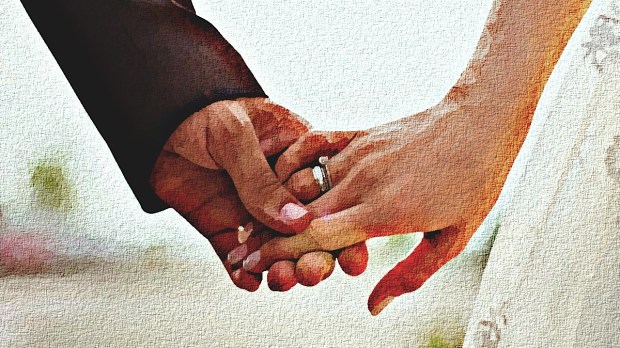This afternoon, I took a few hours off from work to go apple-picking with my wife and children. The eight of us piled into our beat-up minivan and headed off to the orchard. The five-year old started taking selfies in her car seat. Another daughter set up a chorus of whining for music. Our teen in the front seat laughingly struggled to provide her mother with coherent driving directions.
At the farm, the children ran through the boughs of the apple trees heavy with fruit. They were wild with joy, twisting deep red Jonathan apples from the branches and piling them into 10-gallon bags. My wife briefly rested her head on my shoulder. The light slanted golden through the leaves. I stood content, simply happy to be there.
It doesn’t seem like much, this snapshot of a few random hours in a marriage, but to me it’s everything. It’s the fruit of decades of commitment, a relationship that has ripened with the passing years and become the centering force of all that I am.
The importance of marriage
In fact, moments like these, taking place in whatever size or shape of family, these moments that are borne of faithful marriage are, if anything, far more valuable than we think. Each couple knows that their own marriage is important to them and their family. Perhaps what they don’t realize is that their marriage matters to everyone else, too. Marriage is the foundation of society itself. Without the matrimonial bond, everything else falls apart.

St. John Chrysostom felt the topic was so important that he regularly preached on it. His homilies have been collected into a book I highly recommend, in which he encourages the married couples in his church.
He tells them, “The love of husband and wife is the force that welds society together.”
That statement is astounding. For me, it becomes particularly affecting when I consider my own marriage and the way my wife shares her love for me. It’s the little things. She notices when I have a late meeting and has dinner ready for me when I get home. She leaves the last piece of apple pie for me. She notices a loose button on my shirt and reattaches it before I even know it needs to be repaired. The list goes on.
An expansive bond
The point is that the bond between a husband and wife is concrete and tangible. It’s in the details, the way two lives are shared together. If they have children, their love expands and the bond grows stronger. Again, it’s in the details — going apple-picking, watching the kids play sports, teaching the teenager how to drive, helping each other through tough times.
These small intimate moments don’t stay within the marriage. They take on cosmic heft. They are revealed to be weighty, the lived experience of love expressed in thousands of acts of virtue. This is how a healthy society is created. It isn’t politicians, or money managers, or public policy – it’s marriage and family. It’s the little things.
Marriage creates society
Marriage creates society, not the other way around. There is no relationship as close as that of a husband and wife. Their bond is so strong that it creates the conditions for every other human relationship. This doesn’t mean that everyone must be married; we all have our own vocations, but it does mean that the existence of marriage is necessary to all of our thriving. Society isn’t an artificial construct that defines the relationships within it through the application of a theoretical system. Rather, society arises from the natural goods already present in the people who make up that community – specifically the virtues and bonds formed in marriage and the family.

A well-ordered society, like marriage, is not founded on arbitrary rules enforced by fear or the wishes of whatever ruler happens to be in power. It is founded in loving relationships, neighborly good will, and the common good of the entire community. Society is made up of real people. It’s personal. Like marriage, the people within the community are not perfect, but as a husband or wife might, we use our imperfections as opportunities to grow and commit ourselves to faithfulness.
A glue that holds everything together
Chrysostom writes, “How difficult it is to have harmony when husband and wife are not bound together by the power of love!” Perhaps this insight is the key to understanding why he teaches that marriage is foundational to society. At the heart of human interaction, there must be love. A man and wife share a certain type of love, a parent and child another type of love, and neighbors yet a different type of love. All of it is necessary.
Marriage is valuable specifically because it forms a bond within which love is tested and grows stronger. Because of my marriage, I’m a better person outside my home. I do better work at my job, drive more safely, volunteer more, watch out for the kids in the park, and take a more active interest in local affairs and law-making.
It comes down to the little things. Those little acts of love are the glue that holds everything together. My afternoon in the orchard picking apples is my own Garden of Eden. The simple goodness of it is deeply affecting, possessing a creative force propelling me to continue striving to become the sort of man I hope someday to be. I won’t be rash enough to claim I’m a saint who has made the world a drastically better place but, because of my marriage, maybe someday I will.

